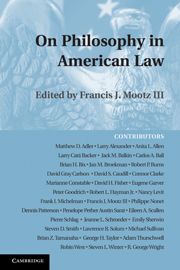Book contents
- Frontmatter
- Contents
- Introduction
- PART I KARL LLEWELLYN AND THE COURSE OF PHILOSOPHY IN AMERICAN LAW
- PART II PHILOSOPHICAL PERSPECTIVES ON LAW
- PART III AREAS OF PHILOSOPHY AND THEIR RELATIONSHIP TO LAW
- PART IV PHILOSOPHICAL EXAMINATIONS OF LEGAL ISSUES
- PART V LAW, RHETORIC, AND PRACTICE THEORY
- PART VI QUESTIONING THE RELATIONSHIP BETWEEN PHILOSOPHY AND AMERICAN LAW
- PART VII COMMENTARIES
- Contributors and Selected Bibliography
- Name Index
Introduction
Published online by Cambridge University Press: 31 July 2009
- Frontmatter
- Contents
- Introduction
- PART I KARL LLEWELLYN AND THE COURSE OF PHILOSOPHY IN AMERICAN LAW
- PART II PHILOSOPHICAL PERSPECTIVES ON LAW
- PART III AREAS OF PHILOSOPHY AND THEIR RELATIONSHIP TO LAW
- PART IV PHILOSOPHICAL EXAMINATIONS OF LEGAL ISSUES
- PART V LAW, RHETORIC, AND PRACTICE THEORY
- PART VI QUESTIONING THE RELATIONSHIP BETWEEN PHILOSOPHY AND AMERICAN LAW
- PART VII COMMENTARIES
- Contributors and Selected Bibliography
- Name Index
Summary
The purpose of a book is never entirely justified. In any event, no one is required to display his motives or to entangle himself in a confession. To attempt it would be self-delusion. Yet, more than anyone, the philosopher cannot refuse to give his reasons.
(Ricoeur 1970: 3)This project has a distinct provenance, and so it might be instructive for the reader to know this history before engaging with the lively and diverse essays in this volume. On the other hand, it is always the case that a project outstrips its humble beginnings and takes on a life of its own; this is particularly true when the project involves thirty-seven individuals. I recognize that my effort to tell the story of an undertaking such as this book is, in the end, fanciful. Nevertheless, I must give my reasons.
I have long admired Karl Llewellyn's irreverent and sweeping prose. Llewellyn cast aside received wisdom about the nature of law in favor of looking at what really goes on in the activities that constitute law. In many ways he was similar to Nietzsche in form and attitude: incisive in his analysis, unique (sometimes odd) in his delivery, committed to clearheaded investigation but rejecting scientism, tortured in his personal life, and maddeningly frustrating both to those who would erect a logical system of thought around his legacy and to those who would deride his efforts as an intellectual blind alley.
- Type
- Chapter
- Information
- On Philosophy in American Law , pp. ix - xxiiPublisher: Cambridge University PressPrint publication year: 2009

